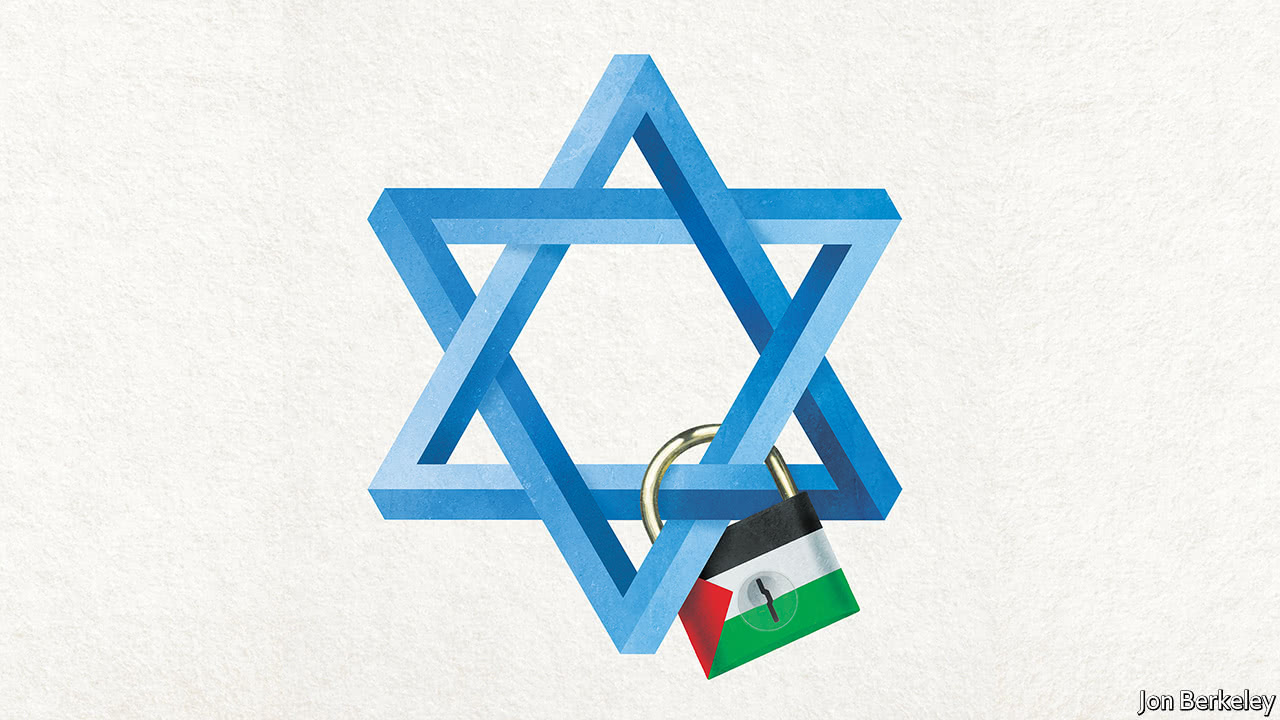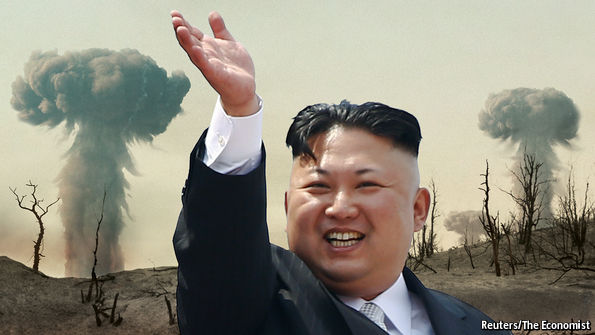Why Israel needs a Palestinian state
More than ever, land for peace also means land for democracy
THE victory of Israel over the Arab armies that encircled it in 1967 was so swift and absolute that, many Jews thought, the divine hand must have tipped the scales. Before the six-day war Israel had feared another Holocaust; thereafter it became an empire of sorts. Awestruck, the Jews took the holy sites of Jerusalem and the places of their biblical stories. But the land came with many Palestinians whom Israel could neither expel nor absorb. Was Providence smiling on Israel, or testing it?
encircle : 둘러싸다, 포위하다
Jack's arms encircled her waist. 잭의 두 팔은 그녀의 허리를 감고 있다.
encircle an army 군대를 포위하다
encircle him and attach him from the rear. 그를 포위해서 후방에서 그를 공격하라
It's no use trying to encircle and intimidate it. 그것을 둘러싸고 위협해도 아무 소용이 없다
tip the scales : 정세를 일변시키다
For the past 50 years, Israel has tried to have it both ways: taking the land by planting Jewish settlements on it; and keeping the Palestinians unenfranchised under military occupation, denied either their own state or political equality within Israel (see our special report in this issue). Palestinians have damaged their cause through decades of indiscriminate violence. Yet their dispossession is a reproach to Israel, which is by far the stronger party and claims to be a model democracy.
unenfranchised : 정치적 자유가 주어지지 않은
indiscriminate : 무분별한
dispossession: 몰아내기; 강탈, 탈취; [법] 부동산 불법 점유
reproach : 비난, 치욕
by far: 훨씬, 단연코
Israel’s “temporary” occupation has endured for half a century. The peace process that created “interim” Palestinian autonomy, due to last just five years before a final deal, has dragged on for more than 20. A Palestinian state is long overdue. Rather than resist it, Israel should be the foremost champion of the future Palestine that will be its neighbour. This is not because the intractable conflict is the worst in the Middle East or, as many once thought, the central cause of regional instability: the carnage of the civil wars in Syria, Iraq and elsewhere disproves such notions. The reason Israel must let the Palestinian people go is to preserve its own democracy.
occupation : 점유, 점령
endure: 자동사 (격식) 오래가다[지속되다]
interim: 임시의
drag on: (너무 오랫동안) 질질 끌다[계속되다]
- The dispute has dragged on for months. 그 분규는 여러 달 질질 끌어 왔다.
long overdue: 오래 미뤄졌다. 한참 전에 행해졌어야 하
intractable : (격식) 문제, 사람이 아주 다르기 힘든
carnage: 대학살
The Trump card
Unexpectedly, there may be a new opportunity to make peace: Donald Trump wants to secure “the ultimate deal” and is due to visit the Holy Land on May 22nd, during his first foreign trip. The Israeli prime minister, Binyamin Netanyahu, appears as nervous as the Palestinian president, Mahmoud Abbas, seems upbeat. Mr Trump has, rightly, urged Israel to curb settlement-building. Israel wants him to keep his promise to move the American embassy to Jerusalem. He should hold off until he is ready to go really big: recognise Palestine at the same time and open a second embassy in Jerusalem to talk to it.
unexpectedly: 뜻밖에, 예상외로
the ultimate deal : 이-팔 평화의 궁극적인 합의
upbeat : (형) (비격식) 긍정적인, 낙관적인
rightly: 당연히, 마땅히
curb: 억제하다
He needs to learn to curb his temper. 그는 성질을 죽이는 법을 배워야 한다.
hold off: 미루다[연기하다]
We could get a new computer now or hold off until prices are lower.
우리가 지금 새 컴퓨터를 살 수 도 있고 가격이 더 내릴 때가지 미룰 수도 있다.
Could you hold off making your decision for a few days?
결정을 며칠 연기해 주시겠어요?
The outlines of peace are well known. Palestinians would accept the Jewish state born from the war of 1947-48 (made up of about three-quarters of the British mandate of Palestine). In return, Israel would allow the creation of a Palestinian state in the remaining lands it occupied in 1967 (about one-quarter). Parcels could be swapped to take in the main settlements, and Jerusalem would have to be shared. Palestinian refugees would return mostly to their new state, not Israel.
The fact that such a deal is familiar does not make it likely. Mr Netanyahu and Mr Abbas will probably string out the process—and try to ensure the other gets blamed for failure. Distracted by scandals, Mr Trump may lose interest; Mr Netanyahu may lose power (he faces several police investigations); and Mr Abbas may die (he is 82 and a smoker). The limbo of semi-war and semi-peace is, sadly, a tolerable option for both.
string something out ~을 질질끌다
They seem determined to string the talks out for an indefinite period.
그들이 그 회담을 무기한으로 질질 끌고 가기로 작정한 모양이다.
I don't want to string out the argument.
distracted by ~ 으로 산만해진 가운데
limbo : (특히 다른 사람의 결정을 기다리는) 불확실한[어중간한] 상태
His life seemed stuck in limbo; he could not go forward and he could not go back.
그의 삶은 이도 저도 아닌 상태에 갇혀 있는 것 같았다. 그는 앞으로 나아갈 수도 없고 뒤로 돌아갈 수도 없었다.
Nevertheless, the creation of a Palestinian state is the second half of the world’s promise, still unredeemed, to split British-era Palestine into a Jewish and an Arab state. Since the six-day war, Israel has been willing to swap land for peace, notably when it returned Sinai to Egypt in 1982. But the conquests of East Jerusalem, the West Bank and the Gaza Strip were different. They lie at the heart of Israelis’ and Palestinians’ rival histories, and add the intransigence of religion to a nationalist conflict. Early Zionist leaders accepted partition grudgingly; Arab ones tragically rejected it outright. In 1988 the Palestine Liberation Organisation accepted a state on part of the land, but Israeli leaders resisted the idea until 2000. Mr Netanyahu himself spoke of a (limited) Palestinian state only in 2009.
unredeemed: <결점 등이> 완화[보상]되지 않은
swap: (어떤 것을 주고 그 대신 다른 것으로) 바꾸다, (이야기 등을) 나누다
notably: 특히
intransigence : (정치상의) 비타협적인 태도, 타협[양보]하지 않음
The talks broke down because of North Korea's intransigence.
북한의 비타협적인 태도로 인해 회담이 결렬되었다.
I hope we don't lose lives because of the intransigence of the U.N.
나는 우리가 UN의 비타협적인 태도로 인해 인명을 잃지 않기를 바란다.
partition: 분할
grudgingly: 마지못해, 억지로
outright: 완전한, 전면적인, 노골적인, 명백한, 노골적으로, 드러내 놓고
Another reason for the failure to get two states is violence. Extremists on both sides set out to destroy the Oslo accords of 1993, the first step to a deal. The Palestinian uprising in 2000-05 was searing. Wars after Israel’s unilateral withdrawal from Lebanon in 2000 and Gaza in 2005 made everything worse. As blood flowed, the vital ingredient of peace—trust—died.
Oslo accords : 오슬로 협정
(국제) 오슬로협정, 1993년 이스라엘의 라빈 총리와 팔레스타인해방기구(PLO)의 아라파트 의장이 만나 팔레스타인 독립국가와 이스라엘이 평화적으로 공존하는 방법을 모색한 합의. 팔레스타인 임시 자치정부 출범의 계기가 됨
uprising: 봉기, 반란, 폭동
searing: 타는[태울] 듯한
The searing heat of a tropical summer
열대 지방 여름의 타는 듯한 더위
unilateral : 일방적인, 단독의
a unilateral decision : 일방적인 [단독] 결정
flowed: 흘러 내리다, 넘쳐 나다
Most Israelis are in no rush to try offering land for peace again. Their security has improved, the economy is booming and Arab states are courting Israel for intelligence on terrorists and an alliance against Iran. The Palestinians are weak and divided, and might not be able to make a deal. Mr Abbas, though moderate, is unpopular; and he lost Gaza to his Islamist rivals, Hamas. What if Hamas also takes over the West Bank?
in no rush: 성급하지 않게
court: ~ 의 환심을 사려고 하다
Both candidates have spent the last month courting the media.
두 후보 모두 지난 한 달은 언론의 환심을 사는 데 보냈다.
All this makes for a dangerous complacency: that, although the conflict cannot be solved, it can be managed indefinitely. Yet the never-ending subjugation of Palestinians will erode Israel’s standing abroad and damage its democracy at home. Its politics are turning towards ethno-religious chauvinism, seeking to marginalise Arabs and Jewish leftists, including human-rights groups. The government objected even to a novel about a Jewish-Arab love affair. As Israel grows wealthier, the immiseration of Palestinians becomes more disturbing. Its predicament grows more acute as the number of Palestinians between the Jordan river and the Mediterranean catches up with that of Jews. Israel cannot hold on to all of the “Land of Israel”, keep its predominantly Jewish identity and remain a proper democracy. To save democracy, and prevent a slide to racism or even apartheid, it has to give up the occupied lands.
complacency: (보통 못마땅함) 현 상태에 만족함, 안주
Despite signs of an improvement in the economy, there is no room for complacency.
경제가 개선되는 조짐들이 있긴 하지만 안주하고 있을 여지는 없다.
There is no time for complacency.
안주하고 있을 때가 아니야.
Co-operation, not collaboration
Thus, if Mr Abbas’s Palestinian Authority (PA) is weak, then Israel needs to build it up, not undermine it. Without progress to a state, the PA cannot maintain security co-operation with Israel for ever; nor can it regain its credibility. Israel should let Palestinians move more freely and remove all barriers to their goods (a freer market would make Israel richer, too). It should let the PA expand beyond its ink-spots. Israel should voluntarily halt all settlements, at least beyond its security barrier.
Israel is too strong for a Palestinian state to threaten its existence. In fact, such a state is vital to its future. Only when Palestine is born will Israel complete the victory of 1967.
'The Economist' 카테고리의 다른 글
| How to have a better death (0) | 2017.05.02 |
|---|---|
| How to deal with the world’s most dangerous regime (0) | 2017.04.25 |







